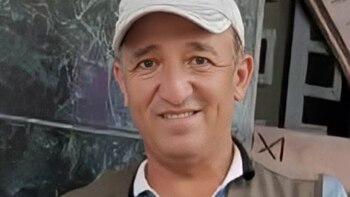
Elena Kaliska of Slovakia continued the country's dominance in slalom by taking gold in the women's Single Kayak K1 slalom. (Getty Images)The International Canoe Federation's concerns about smog and weeds didn't materialize during the Olympics, but it was caught off-guard by lightning storms that forced the cancellation of events one day.
In previous trips to Shunyi Olympic Rowing-Canoeing Park, Secretary General Simon Toulson tells Around the Rings, "We'd never experienced such storms."
Rain by itself isn't a problem for the sport and the basin at Shunyi protected the paddlers from the wind. But on the third day of slalom, lightning in the vicinity forced K1 races to be postponed to the next day.
"If it's lightning, the paddles are made of carbon fiber," Toulson says. "If you get struck, the athlete would die instantly."
Luckily for the sport, he says, broadcasters in central Europe and northern America were willing to broadcast the events the following day.
Toulson called the flatwater course "idyllic." Although the rowing competition at the same venue had problems with the growth of weeds, canoe didn't experience any obstructions. "I don't know if they cut the weeds very well because of rowing, or if was because where we were competing it was only 1,000 meters," he says.
Slalom course difficult
Toulson says the artificial slalom course was "probably the most difficult course we've ever had in an Olympic Games. I wouldn't like to see a course like that every competition. It would be too unpredictable."
Some of the favorites failed to make the final while unexpected athletes won medals.
"In our sport, you have to have some calm water throughout upstream gates, so the athlete with the most skill does actually come off the best," Toulson says. "If you have rough water, you can get stuck in an eddy. You can be the best athlete in the world and not medal."
Toulson says the water flow was very strong. It's usually 13 cubic meters a second, but in Beijing it was 17.
He says those factors caused many women to struggle in the K1 competition, including China's Li Jingjing, who was ranked No. 1 in the world. She was leading and almost a certain gold medalist when she capsized on her second run, missed two gates and ended up with 150 seconds in penalties.
Australia's Jacqueline Lawrence, ranked No. 52 in the world, was thesilver medalist.
New countries winning medals
Slovakia continued its domination of slalom by taking three of the four gold medals, including the third straight C2 gold medal for brothers Peter and Pavol Hochschorner. But Benjamin Boukpeti also made history when he won Togo's first Olympic medal in any sport by taking the bronze in men's K1.
Boukpeti, who trains in France and South Africa, had a bad first run, but was the fastest on the course in the semifinal. Benjamin Boukpeti, Togo's first Olympic medalist, posted the fastest time during the semifinal of the Kayak Single (K1) on Aug. 12, 2008. The time followed a bad first run earlier in the competition. (Getty Images)Although his lack of experience may have caught up to him in the final, Toulson says, he brought a lot of exposure to the sport in Africa.
In flatwater, nine different countries won gold medals in the 12 events, including Belarus. "A big spread of medals only helps our sport," Toulson says.
The biggest growth in slalom is currently in Asia. More countries are also taking up paddles in Africa and Oceania, where white water can be found on natural waterways with the help of dams.
The number of federations in Africa has gone from nine to 17 in fouryears, with Rwanda and Ghana joining a few months ago. In the past 10 years, the number of federations has increased from 125 to 147.
"For our big brother, rowing, you have to have special equipment," Toulson says. "In these countries, people canoe already. We're giving a mode of transport a sporting premise."
Changes on the way in flatwater
Li Jingjing, ranked number one in the world, was one of many surprising losses during the difficult K1 competition. Leading the competition until her second run, the Chinese rower capsized, opening the door for competitors like Australia's Jacqueline Lawrence. (Getty Images)The ICF is analyzing which events could be shortened from 1,000m or 500m to 200m. As part of that change in philosophy, the federation is proposing changing the name of flatwater to canoe sprint. The changes could be approved at the ICF Congress in November and be ready for London 2012, Toulson says.
"We're trying to make shorter distances so the races become more exciting," Toulson says.
With 200m races, spectators can see the whole course.
Increased numbers for slalom?
The ICF is lobbying the IOC "very hard" Toulson says, to add more athletes to slalom. The sport has only 82 places spread over four disciplines.
Each country is allowed only one entrant in each discipline, so countries like France, Slovakia, Great Britain and Germany had to leave some of the world's best athletes at home. "Out of the top 10 in the world, only four of the best were at the Olympics," Toulson says. "Our qualifiers for the Olympics are much more difficult than the Olympic Games."
With more athletes, the ICF could expand competition from four days to six or seven days.
"The atmosphere was electric," he says of the sold-out, 12,000-seat venue. "The IOC should look at that. Why can't we have 30 or 40 more athletes to
make this a more entertaining week?"
Work on image, broadcasting
Toulson says the ICF is looking at ways to take advantage of how many people canoe throughout the world, particularly in the United States, Great Britain and France where millions participate.
He says the the goal is to become more modern and dynamic, while packaging the sport better on television.
"Our sport has been very good operating internationally," Toulson says, "but it hasn't really promoted itself in terms of media and marketing.
That's going to change."
The president will change with the new Congress. Ulrich Feldhoff of Germany will be replaced by Jose Perurena of Spain, currently the ICF 1st vice president.
"He's open to new ideas and moving the sport forward in a dynamic and positive way," Toulson says.
Últimas Noticias
Sinner-Alcaraz, the duel that came to succeed the three phenomenons
Beyond the final result, Roland Garros left the feeling that the Italian and the Spaniard will shape the great duel that came to help us through the duel for the end of the Federer-Nadal-Djokovic era.
Table tennis: Brazil’s Bruna Costa Alexandre will be Olympic and Paralympic in Paris 2024
She is the third in her sport and the seventh athlete to achieve it in the same edition; in Santiago 2023 she was the first athlete with disabilities to compete at the Pan American level and won a medal.

Rugby 7s: the best player of 2023 would only play the medal match in Paris
Argentinian Rodrigo Isgró received a five-game suspension for an indiscipline in the circuit’s decisive clash that would exclude him until the final or the bronze match; the Federation will seek to make the appeal successful.

Rhonex Kipruto, owner of the world record for the 10000 meters on the road, was suspended for six years
The Kenyan received the maximum sanction for irregularities in his biological passport and the Court considered that he was part of a system of “deliberate and sophisticated doping” to improve his performance. He will lose his record and the bronze medal at the Doha World Cup.

Katie Ledecky spoke about doping Chinese swimmers: “It’s difficult to go to Paris knowing that we’re going to compete with some of these athletes”
The American, a seven-time Olympic champion, referred to the case of the 23 positive controls before the Tokyo Games that were announced a few weeks ago and shook the swimming world. “I think our faith in some of the systems is at an all-time low,” he said.




